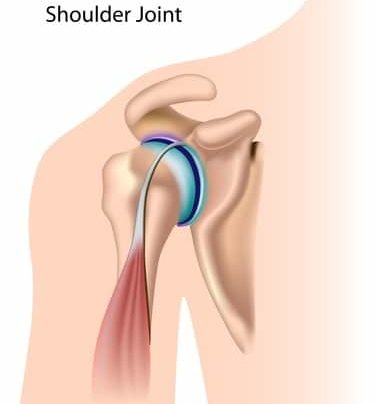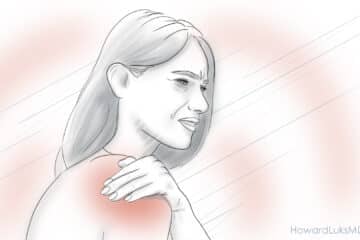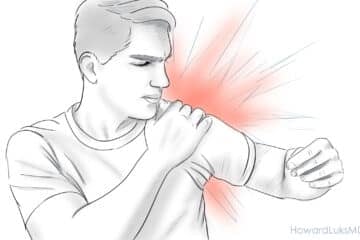
Your shoulder hurts and you see your doctor. You expect an MRI to be performed, and many doctors will oblige you and order that MRI. But .. what if I told you that almost no one has a “normal” shoulder MRI? What if I told you that before your injury, or before your pain started your MRI might have shown tears simply because we age and wear out? Shoulder MRIs performed too soon often lead to unnecessary surgery. Many of the changes we see on a shoulder MRI are simply a consequence of activity and aging.
We have a huge problem in the United States where you as a patient are being over-diagnosed and over-treated. This has been an emerging trend for a while. We have a high-tech low-touch approach to treating patients. Many physicians will look at an MRI reading and tell you what’s wrong and that you need surgery to fix it. We deserve far better than that.
Do I really need that MRI?
Many patients who hear the word “tear”, think (understandably) that must mean that it is abnormal and often choose to have the tear fixed when their physician recommends it. It sounds logical.. no? Unfortunately, many of your parts in your body wear out. They fray, they tear and those findings frequently mean nothing. Most of you with labral tears in your shoulder, especially superior labral tears or SLAP lesions have had them for years before your shoulder was MRI performed. Yes.. the tear was pre-existing … and therefore may NOT be the source of your pain and thus does NOT require surgery.
A recent scientific paper reported the results of a shoulder MRI performed in 50 patients between 40 and 60 years of age.
The authors concluded:
To avoid overtreatment, physicians should realize that superior labral tears diagnosed by MRI in individuals between the ages of 45 and 60 years may be normal age-related findings.
The authors found that upwards of 70% of shoulders had a superior labral tear- or a SLAP lesion. Again, that means that 70% of people between 40 and 60 years of age have these “tears” and do not know it. Yes, many were overhead athletes, and many were very active.
Shoulder MRI will almost always find something wrong
There is no doubt that labral tears and SLAP lesions are being over-diagnosed and therefore over-treated. That translates to many people having unnecessary surgery on the shoulder. What we know about SLAP lesion surgery is that:
- It is a surgery with a high incidence of post surgical stiffness as a complication.
- A surgery with a very high failure rate.
- A surgery that most of you do not need performed.
- A surgery with a long convalescence– often times meaning months out of work.
Shoulder MRI findings do not often require treatment
Bottom Line:
An MRI performed on patients with no shoulder pain can reveal a very high rate of labral tears, specifically superior labral tears or SLAP lesions. Obtaining a routine MRI because you have had shoulder pain for a week from working out hard, or you were working in your garden for a few hours is not a wise decision on the part of your doctor. Time, rest, and PT tend to work very well at restoring your function and alleviating your pain– for most of you. If your Orthopedist will not see you unless you already had an MRI — well, you need a new Orthopedist. We should endeavor to treat patients, not MRI findings — and all the recent scientific literature shows that this approach is the proper one.
Do you have questions regarding an Orthopedic injury or longevity?
Do you want to talk to an expert who can listen to you for 45-60 minutes and explain the options in detail?
Dr. Howard Luks offers remote guidance sessions to review your X-ray or MRI images and explain your options.
Dr. Luks has also received hundreds of requests for educational sessions on the topics discussed in his book, Longevity Simplified.
In addition, without a detailed history — your story, and physical exam it is impossible to determine if the findings on the MRI are potentially the source of your pain.
Before you consider going for that MRI because you’ve had a week or two of shoulder pain you need to keep in mind that there is a strong chance that the MRI will reveal something.













David Anible
I am a 63 yo male. I worked construction for many years. 10 years ago I started working out and lifting weights. After about 6 weeks I started experiencing shoulder pain, especially at night. Was difficult raising my arms above my head at times. I stopped working out and the pain gradually went away but on rare occasions. I tried a couple times afterwards to get back into working out with the same results. I had an MRI of both shoulders in 09/2017. Both shoulders had intrasubstance hyperintensity involving IGHL and a partial tear and strain (ALPSA). I wish to work out again and be able to work with my arms over my head. I’ve read a lot but do not know which way to turn on this one. Would you advise?
I cannot offer specific treatment advice in this format. In this setting, there is no doctor-patient relationship, so I can only try and educate people to improve their conversations with their own health professionals.
I can say that most shoulder docs who agree that an ALPSA lesion is not the cause of pain at your age. Labral tears in the shoulder are exceptionally common and are considered an age-appropriate finding in many, if not most people over 45-50.
In most 63-year-olds, the more likely causes of pain include the biceps, the rotator cuff and an area we call the subacromial space (bursitis). Perhaps a second opinion on your MRI reading, and a second opinion by a shoulder specialist will help you better determine what the cause of pain is.
Peggy Potochar
This advice is what my occupational therapist has been telling me for the last year, and it goes for most parts of the body. Rest, rehab and strengthening has worked miracles for me. Thanks for the great column.
Leon Richard, PT, DPT, OCS
Excellent piece I’m sharing on my clinic page and personally.
Jean H
Thank you Dr. Luks that is good news. What is injected? I have seen saline and acetic acid in articles. Do you have a reference on the technique?
Jean H
Thanks Dr Luks. I know you mentioned in one of your videos ultrasound to remove calcifications. I have done some research and there are a number of modalities to treat it, none that I saw have great long term success. Better at treating acutely. I know it is outside the realm of this discussion but maybe it could be a topic of another discussion? Like I said I rely on my arm for my work, I would love a long term solution.
Ultrasound guided injections for calcific tendonitis are often a permanent solution.
Jean H
I am 52 and have had pain for 20 years now in my right shoulder when sleeping. I had played softball and volleyball for years when younger into my early 30’s.
In the past 2-3 years the night pain has worsened significantly. Last week I woke up in pain towards an 8 (1-10), whereas it had been a 4-5 subsiding, now it is constant. I saw an orthopedic, had radiographs and there is calcification of a tendon, outside the joint, more bible on the arm extended laterally and the oblique lateral I believe. I asked which one and for some reason he would not say, not biceps is all he would say. I have weakness and pain with certain movements but not others. Mostly lateral and forward arm raises but not rotational (arms bent at 90 and rotating side to side).
I have an MRI scheduled. I am confused as to the origin of the pain, he did not think it was the calcification, nor the rotator cuff. Any thoughts? I am a veterinarian and oral surgeon and my right arm is my livelihood, surgery downtime would be difficult but the pain is definitely negatively affecting my life for years now. Will the MRI lead us down the wrong path here? I am thinking of booking with you (I am in CT), because I feel my questions were not being answered. Thanks for any advice.
Calcific tendonitis can be a very painful condition. The exam and history should give the diagnosis… the MRI can confirm it. The MRI might or might not confuse the issue since many 52 year olds have degenerative rotator cuff tears and no pain or disability. The treatment of your shoulder would be geared towards the most likely pain generator.
HJL
Lamart Clay
Doc, I had a AC joint grade 3 tear back in July 2015. I am 44 years old and the pain is intermittent and it is still a little uncomfortable with certain movements at certain times. I opted not to do surgery and completed 5 -6 weeks of physical therapy. It is not my dominant arm and I work a desk job. I am considering surgery but am unsure if it would benefit me.
Then why are you considering surgery ?
David E PT, DPT
Great piece which follows suit with many findings in other areas of the body such a the lumbar and cervical spine. Dr. Luks what clinical findings do you use to determine if an MRI is warranted?
Clinical exam and X-rays initially. Trauma and weakness = MRI. Routine pain will no antecedent trauma, no weakness, etc then PT, perhaps injection. IF PT/injection, etc ineffective at managing pain, then MRI.
Tracy Urvater, DPT, OCS
I’ve been preaching this to my patients for years!!! It’s nice to know that we are on the same page!! Convincing patients who are used to running for imaging is a tough knot to break! Will repost this!
Thanks Tracy …